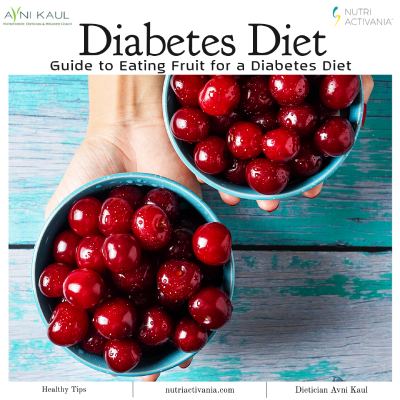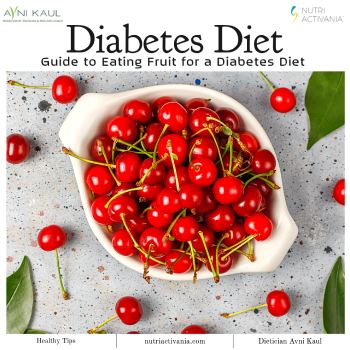“Can I still enjoy fruits if I have diabetes?” It is a question that often arises when someone receives a diagnosis of diabetes. The concern is valid—after all, fruits contain natural sugars (fructose) that can affect blood sugar levels. However, the story doesn’t end there. Yes, fruits do contain fructose, but they also pack a powerful nutritional punch. They are rich in essential vitamins, minerals, and phytochemicals, which are vital for overall health. Diabetes management requires careful attention to diet, but that doesn’t mean saying goodbye to fruits entirely. Incorporating fruits into a diabetic meal plan can offer numerous health benefits. Let us delve deeper into this topic with insights from the top Dietician for diabetes Avni Kaul.
How to choose your fruits while you have diabetes?
- Carbohydrate Content: Fruits contain carbohydrates, which can elevate blood sugar levels. It is crucial to monitor carbohydrate intake and balance it with medication, diet, and lifestyle adjustments. Aim for servings with no more than 15 grams of carbohydrates per serving, adjusting portion sizes based on the fruit’s carbohydrate content.
- Glycemic Index and Load: Consider the glycemic index (GI) and glycemic load (GL) of fruits. The GI indicates how quickly a food raises blood sugar levels, while the GL accounts for portion size. Opt for fruits with low GI and GL values to minimize rapid blood sugar spikes. Examples include apples, grapefruit, and berries.
- Fructose Metabolism: Fructose, the natural sugar in fruits, is metabolized quickly by the liver. While consuming whole, fresh fruits is less likely to cause blood sugar spikes compared to high-fructose corn syrup found in beverages, it is essential to be mindful of fructose intake, particularly from fruit juices which are associated with a higher risk of diabetes.
- Fibre Content: The fibre in fruits, both soluble and insoluble, helps slow down digestion, preventing blood sugar spikes. Opt for fruits with edible peels, like apples and berries, as they retain more fibre. Fresh, whole fruits have higher fibre content compared to cooked or processed forms.
- Antioxidants: Choose fruits with darker hues, such as deep reds, purples, and blues, as they are rich in antioxidants. These compounds help fight free radicals and inflammation, reducing the risk of chronic diseases like type 2 diabetes. Adding colourful fruits to your diet ensures a good intake of antioxidants.
- Types of Fruits to Limit: Dried fruits, fruit juices, and fruits high in sugar and low in fibre should be consumed sparingly. Dried fruits are concentrated sources of carbohydrates and may contain added sugars. Fruit juices lack fibre and can cause rapid blood sugar spikes. Choose whole fruits over juices and limit intake of dried fruits to manage blood sugar levels effectively.
Which Fruits to Consume for Diabetics?
- Berries like strawberries, blueberries, and blackberries are rich in vitamin C, folic acid, fibre, and anti-inflammatory phytochemicals. They aid glucose metabolism and weight control.
- Apples, rich in fibre and vitamin C, with only 95 calories and 25g of carbohydrates per medium fruit, are a diabetic-friendly choice. Their skins harbour essential nutrients and heart-protective antioxidants.
- Citrus fruits like oranges, grapefruit, lemons, and limes are rich in vitamin C, A, and potassium. Their phytonutrients combat inflammation, cell damage, and cardiovascular issues, benefiting diabetics’ health.
- Pears are rich in fibre and hence are a good choice for diabetics. Opt for ripe pears.
- Low-calorie kiwis provide vitamin C, potassium, and fibre, making them ideal for diabetes.
- Portion size matters when it comes to diabetes management. A small serving, like 1/3rd to ½ cup of juice or 2 tablespoons of dried fruits, contains about 15g of carbohydrates. This is much less than it seems, so portion control is vital. Consult a qualified dietitian for personalized guidance.
Therefore, people with diabetes must choose fruits wisely, considering factors like carbohydrate content, glycemic index, and fibre. Consulting doctors and nutritionists ensure effective dietary management.



